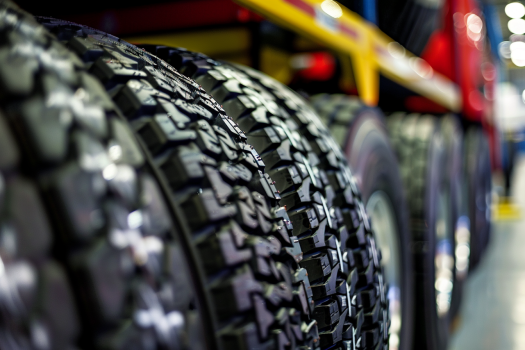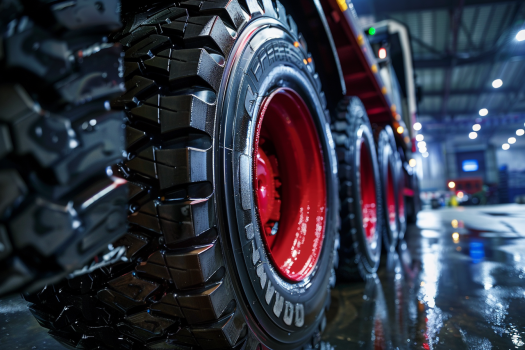Last Updated on August 28, 2024
Best Truck Tires for Highway Driving: Smooth, Safe, and Reliable Journeys on the Open Road
Selecting the proper tires cannot be overstated in long-haul trucking. Tires are the critical link between your truck and the road, affecting everything from fuel efficiency and safety to ride comfort and vehicle performance. In this guide, we will delve into the demands highway driving places on tires and discuss why choosing the right tires is paramount for trucks. We’ll also explore the essentials of truck tires, including the types available, what the various specifications mean, and how tire design influences highway performance. But most of all, you’ll explore the best highway-driving tires. Ready? Then, let’s dive in!

Understanding Tire Basics for Trucks
Before anything else, it is paramount for you to understand the basics of truck tires. Tires are one of the most significant investments in truck maintenance, and choosing the right tires can profoundly impact your vehicle’s performance, safety, and bottom line. But there are so many types, and before you can choose the best one, you need to familiarize yourself with the ones there are.
Types of Truck Tires
Truck tires are categorized based on their intended use, directly influencing their design and construction. The main types of truck tires include:
- Steer Tires: Designed for the front axle of the truck, steer tires have a unique tread design that provides precise steering, stability, and a smooth ride. They are built to withstand the pressure of turning and cornering.
- Drive Tires: These tires are engineered to provide traction and transmit power from the engine to the road. They have deeper tread patterns to enhance grip, especially in wet or slippery conditions. They are located on the drive axle.
- Trailer Tires: These tires are designed for the trailer axle and are built to carry heavy loads. They have a stiffer sidewall to reduce sway and ensure stability when hauling goods.
- All-Position Tires: Versatile, durable, all-position tires can be used on any axle. They are a good option for trucks that don’t carry heavy loads or drive in extreme conditions.
Highway Driving Demands on Tires
Now that you know the basics, let’s look into the topic of truck driving (or, in other terms, highway driving). Highway driving, particularly for trucks, poses unique challenges and demands on tires that significantly influence their design, construction, and performance characteristics. Understanding these demands is essential for making informed decisions about tire selection. Key considerations include:
- Durability and Longevity: Highway driving involves long periods at consistently high speeds, which can generate heat and accelerate tire wear. Tires designed for highway use are constructed to withstand these conditions, offering excellent durability and longer life spans.
- Fuel Efficiency: A tire’s rolling resistance directly impacts fuel consumption. Tires optimized for highway driving are designed to minimize rolling resistance, improve fuel efficiency, and reduce operating costs.
- Traction and Stability: Maintaining traction and stability is crucial for safety while driving at high speed on highways. Good highway tires provide reliable performance in various weather conditions, including wet roads, ensuring that trucks remain stable and manageable.
- Comfort and Noise Reduction: The design of highway tires also considers the driver’s comfort. They are engineered to reduce road noise and provide a smoother ride, which is particularly important during long hauls.
What are the Features of the Best Truck Tires for Highway Driving?
Selecting the right highway tires for trucks is essential for maximizing long hauls’ performance, safety, and efficiency. The best highway tires combine several key features to meet the rigorous demands of extended driving on paved roads. The following are the critical characteristics defining the best highway truck tires.
Durability and Longevity
Durability and longevity are paramount for highway tires, as trucks often cover thousands of miles under varying conditions. The best tires are constructed with high-quality materials and advanced rubber compounds that resist wear and tear, offering a longer service life. Features that contribute to durability include:
- Advanced Tread Compounds: These are engineered to resist abrasion, chipping, and tearing, extending the tire’s life.
- Reinforced Sidewalls: Help to protect against impacts and cuts, reducing the risk of premature failure.
- Retreadability: Many high-quality truck tires are designed to be retreaded, allowing for extended use and contributing to their overall value and sustainability.
Fuel Efficiency
Fuel efficiency is a crucial consideration for long-haul trucking. Tires with low rolling resistance require less moving energy, leading to significant fuel savings over time. Manufacturers achieve low rolling resistance through:
- Optimized Tread Design: Minimizes friction and heat generation at the road surface.
- Advanced Rubber Compounds: Provide flexibility and reduced drag.
- Aerodynamic Sidewall Designs: Reduce air drag on the tire, contributing to improved fuel efficiency.
Traction and Stability
Maintaining control over the vehicle is essential for highway driving, especially under heavy loads or in adverse weather conditions. The best tires offer:
- Enhanced Tread Patterns: Designed to maintain a grip on dry and wet roads.
- Wide Footprints: Distribute the vehicle’s weight more evenly, improving stability and handling.
- Groove Technology: Channels water away from the tread to prevent hydroplaning.
Comfort and Noise Reduction
Driver comfort is an essential aspect of long-haul trucking. Tires can significantly impact the noise level and ride comfort of a truck. Features that enhance comfort include:
- Noise-dampening Tread Patterns: Reduce road noise for a quieter cabin environment.
- Flexible Sidewalls: Absorb road vibrations, providing a smoother ride.
- Uniform Construction: Ensures balanced performance and minimizes vibrations.
Wet Weather Performance
The ability to perform safely in wet conditions is critical for highway tires. This includes maintaining traction, preventing hydroplaning, and ensuring stable handling. Essential features for damp weather performance are:
- Deep Tread Grooves: Help to channel water away from the tread surface.
- Open Shoulder Designs: Allow for better water evacuation and improved grip in wet conditions.
- Siping: Small cuts in the tread blocks that open up as the tire rotates, creating additional edges for grip on wet surfaces.
The Importance of Choosing the Right Tires for Trucks
Selecting the appropriate tires for highway driving is not just a matter of performance; it’s a crucial decision that affects the overall safety, efficiency, and cost-effectiveness of truck operations. The right tires can:
- Enhance Safety: The proper tire selection ensures better handling, shorter stopping distances, and reduced risk of blowouts or accidents, directly impacting the safety of the driver and other road users.
- Improve Fuel Economy: Truck operators can significantly reduce fuel consumption by choosing tires with low rolling resistance, leading to considerable savings and a lower environmental impact.
- Increase Payload Capacity: Certain tires are designed to support heavier loads without compromising performance, allowing trucks to carry more goods in a single trip.
- Reduce Overall Operating Costs: Durable tires suited to highway driving will last longer and perform better, reducing the need for frequent replacements and maintenance.
- Comply with Regulations: In many regions, specific regulations regarding tire specifications for trucks, especially for highway use, exist. Selecting the proper tires ensures compliance with these legal requirements, avoiding fines and penalties.
Top Picks for Best Truck Tires for Highway Driving
As previously mentioned, selecting the correct set of tires ensures highway trucks’ safety, efficiency, and performance. However, the top tires exceed these to give you quality, warranty, reliance, and satisfaction. Therefore, to help truck owners and fleet managers make informed decisions when purchasing highway truck tires, we’ll investigate the leading brands and models and compare their features.

Review of Leading Brands and Models
Several critical brands known for their quality, innovation, and performance dominate the truck tire market. Each brand offers a range of tire models designed to meet the specific needs of highway driving. While discussing particular brands and models, it’s essential to consider factors such as durability, fuel efficiency, traction, and wet weather performance. Leading brands invest heavily in research and development to offer tires that balance these critical features.
Comparative Analysis of Features
Evaluating several features that impact performance and operational costs is essential when comparing highway truck tires. This section will compare tires based on the following:
- Durability and Longevity: Assessing the tread life expectancy and the tire’s ability to withstand long hours on the road without significant wear.
- Fuel Efficiency: Comparing the rolling resistance of different tire models and how it affects fuel consumption.
- Traction and Stability: Evaluating the tire’s grip and handling stability, especially under heavy loads and at high speeds.
- Comfort and Noise Reduction: Reviewing the tire’s design features that contribute to a quieter and smoother ride.
- Wet Weather Performance: Comparing how different tires perform in rainy conditions, focusing on their ability to prevent hydroplaning and maintain grip.
Pros and Cons of Each Tire Model
This section will provide a detailed analysis of each selected tire model, highlighting its strengths and potential drawbacks. For instance:
Model A:
- Pros: Excellent fuel efficiency, superior wet weather performance, and low noise level.
- Cons: Higher upfront cost and limited availability in some sizes.
Model B:
- Pros: Exceptional durability and longevity, good traction in various conditions.
- Cons: Slightly lower fuel efficiency, stiffer ride.
Model C:
- Pros: Affordable price point, good overall performance.
- Cons: Quicker wear is needed in extreme conditions, and noise levels are moderate.
Truck owners can better align their tire selection with their specific needs and operational priorities by providing a balanced view of each tire’s advantages and disadvantages.
Factors to Consider When Choosing Highway Tires for Trucks
Selecting the correct set of highway tires for your truck is a crucial decision that impacts not only the performance and safety of the vehicle but also its operational costs. Several key factors must be considered to ensure that you choose the best tires for your specific needs.
Vehicle Type and Size Compatibility
The first step in selecting the right highway tires for your truck is to consider the type and size of your vehicle. Different types of trucks, from light-duty pickups to heavy-duty tractor-trailers, require tires that are specifically designed to accommodate their unique specifications and performance requirements.
- Size Compatibility: Ensure your tires are the correct size for your truck’s wheels. Incorrect tire sizes can affect the truck’s handling, fuel efficiency, and safety.
- Type of Truck: Consider the specific design and purpose of your truck. For instance, a long-haul truck will have different tire needs than a regional delivery truck, primarily due to differences in load capacity and the distances covered.
Load Capacity and Speed Rating
Understanding the load capacity and speed rating of tires is vital for maintaining the safety and efficiency of your truck on the highway.
- Load Capacity: This indicates the maximum weight each tire can safely support. Choosing tires with an adequate load capacity is essential for preventing tire failure, which can lead to accidents or damage to the vehicle.
- Speed Rating: The speed rating of a tire specifies the maximum speed at which the tire can safely carry a load. Especially for trucks that spend a lot of time on highways, selecting tires with a suitable speed rating is crucial to ensure safety at higher speeds.
Climate and Seasonal Considerations
The operating climate and seasonal changes are significant factors in selecting the right highway tires. Different tires are optimized for various weather conditions, and choosing the right type can dramatically impact performance and safety.
- All-Season Tires: These tires are designed to perform well in various conditions, including wet roads and light winter weather.
- Winter Tires: Specialized winter tires provide improved traction on snow and ice for trucks operating in regions with severe winter conditions.
- Summer Tires: In warmer climates, summer tires perform better on dry and wet roads, delivering optimal handling and efficiency.
Budget and Value for Money
While budget constraints are a reality for most, investing in quality tires can lead to savings in the long run through reduced fuel consumption, fewer tire changes, and minimized downtime due to tire-related issues.
- Initial Cost vs. Long-Term Savings: Consider not only the upfront cost of the tires but also their durability and impact on fuel efficiency. High-quality tires may have a higher initial price but can offer better value over their lifespan.
- Warranty and Support: Look for tires with a comprehensive warranty and support from the manufacturer. This can provide peace of mind and protection for your investment.
Maintenance Tips for Highway Tires on Trucks
Maintaining highway tires in optimal condition is crucial for truck operations’ safety, efficiency, and longevity. Proper tire maintenance not only extends the life of the tires but also ensures that trucks remain safe and reliable on long hauls. Therefore, here are some essential maintenance tips covering regular inspection and care, proper tire rotation practices, the importance of correct tire pressure, and handling tire wear and damage.
Regular Inspection and Care
Regular inspection and care of your truck’s tires are fundamental to identifying and addressing potential issues before they lead to significant problems or failures.
- Visual Inspections: Conduct thorough visual inspections of tires before and after trips. Look for signs of wear, damage, or foreign objects lodged in the tread.
- Tread Depth: Check the tread depth regularly to ensure it meets legal and safety requirements. Tires with insufficient tread depth have reduced traction and are more prone to hydroplaning on wet roads.
- Sidewall Condition: Examine the sidewalls for cuts, bulges, or other damage that could indicate structural problems. Sidewall damage often necessitates tire replacement.
Proper Tire Rotation Practices
Tire rotation is a critical maintenance task that ensures even tire wear and extends the life of your tires.
- Rotation Schedule: Follow the manufacturer’s recommendations for tire rotation intervals, typically every 5,000 to 8,000 miles for trucks, depending on usage patterns and tire types.
- Rotation Patterns: Use the appropriate rotation pattern for your truck’s configuration (e.g., same side rotation for directional tires or cross-rotation for non-directional tires) to ensure even wear across all tires.
Importance of Correct Tire Pressure
Correct tire pressure is essential for your truck’s safety, performance, and fuel efficiency.
- Regular Checks: Check tire pressure at least weekly and before long trips. Tire pressure should be adjusted according to the load carried and the manufacturer’s specifications.
- Effects of Incorrect Pressure: Underinflated tires can lead to increased fuel consumption, reduced handling, and overheating, which may cause tire failure. Overinflated tires can decrease traction and improve wear.
- Use of Tire Pressure Monitoring Systems (TPMS): Use TPMS for continuous monitoring and early detection of pressure deviations.
Handling Tire Wear and Damage
Properly addressing tire wear and damage is crucial to maintaining tire performance and safety.
- Monitoring Wear Patterns: Uneven wear patterns, such as cupping or feathering, can indicate alignment or suspension issues that must be corrected.
- Repairing Damage: Some types of tire damage, like small punctures in the tread area, can be professionally repaired. However, significant damage, particularly to the sidewall, often requires tire replacement.
- Preventive Measures: Implement preventive measures such as aligning and balancing tires regularly to reduce uneven wear and extend tire life.
Installation and Safety Guidelines for Truck Tires
Proper installation and adherence to safety guidelines are critical to ensuring the performance and longevity of truck tires, especially for those used in highway driving. Below are some essential considerations for professional installation versus DIY, ensuring your tires meet highway safety standards.

Professional Installation vs. DIY
While some truck owners may consider installing tires to save on costs, professional installation is often the better choice.
- Professional Installation: Certified technicians have the tools, knowledge, and experience to ensure that tires are correctly mounted, balanced, and inflated according to the manufacturer’s specifications. They can also identify and address any wheel or suspension system issues affecting tire performance and safety.
- DIY Installation: You must have the proper equipment and be familiar with tire installation procedures to ensure that DIY tire mounting is safe. Incorrect installation can lead to tire failure on the highway, posing a severe safety hazard. Additionally, DIY installation may void some tire warranties.
Ensuring Your Tires Meet Highway Safety Standards
To guarantee the safety of your truck tires on the highway, it’s essential to ensure they meet the applicable safety standards.
- Tire Selection: Choose tires designed for highway use and compatible with your truck’s make and model. Ensure they have the appropriate load and speed ratings for your vehicle’s operating conditions.
- Inspection and Maintenance: Regular inspections and maintenance are vital to detect and address any issues, such as wear, damage, or improper inflation, that could compromise safety.
- Compliance with Regulations: Familiarize yourself with and adhere to national and local regulations regarding tire safety, including tread depth minimums, tire age limits, and requirements for winter tires in certain regions.
Tips for Maximizing Tire Lifespan and Performance
Maximizing the lifespan and performance of your truck tires enhances safety and contributes to operational efficiency and cost savings.
- Regular Pressure Checks: Maintain the correct tire pressure as the manufacturer recommends. Underinflated or overinflated tires can lead to uneven wear, reduced fuel efficiency, and increased risk of tire failure.
- Routine Rotations and Alignments: Follow the manufacturer’s recommendations for tire rotations and ensure that your truck’s alignment is checked and adjusted regularly. Proper alignment prevents uneven wear and extends tire life.
- Avoid Excessive Loads: Do not exceed the load capacity of your tires. Overloading can cause excessive heat buildup, leading to tire degradation and potential failure.
- Drive Responsibly: Avoid aggressive driving behaviors such as speeding, rapid starts, and hard braking, which can accelerate tire wear and reduce lifespan.
- Seasonal Considerations: If you operate in an area with severe winter weather, consider using winter tires or chains as required by law or conditions. Swap back to highway tires when the season changes to avoid premature wear of winter-specific treads.
Conclusion
For truck drivers and fleet managers, the key to maximizing the benefits of your highway tires lies in diligent selection, consistent maintenance, and staying abreast of technological advancements. Prioritize tires with the best durability, efficiency, and safety features to suit your specific operational needs. Implement a regular maintenance schedule, including inspections, rotations, and pressure checks, to extend the lifespan of your tires and ensure they perform safely under all conditions. Embrace innovations in tire technology and sustainability practices to improve your fleet’s operational efficiency and contribute to environmental conservation.
As the industry evolves, partnering with a trusted tire provider becomes increasingly essential. Tires Easy Truck offers a comprehensive selection of high-quality tires designed to meet the diverse needs of the trucking industry. With our expert guidance and extensive inventory, we are committed to helping you find the perfect tires for your highway driving needs.
Make the Right Choice with Tires Easy Truck
With the insights and recommendations provided, you are well-equipped to make informed decisions that will enhance your fleet’s safety, efficiency, and performance. Whether you’re updating your current fleet or selecting tires for a new addition, Tires Easy Truck is here to support you every step of the way.
Explore Our Selection and Find Your Perfect Match Today!
Choose Tires Easy Truck for unparalleled quality, expert advice, and a commitment to your satisfaction. Let’s ensure your trucks are equipped for the journey ahead, maximizing highway safety, efficiency, and performance.
FAQs
What makes highway truck tires different from other types of truck tires?
Highway truck tires are specifically designed for long-distance travel on paved roads. They feature tread patterns and rubber compounds optimized for durability, fuel efficiency, and a smooth ride at high speeds. Unlike off-road or all-terrain tires, highway tires have less aggressive tread patterns, reducing noise and increasing comfort during long hauls.
How often should truck tires be rotated?
Tire rotation frequency can vary based on the manufacturer’s recommendations, the tire type, and the truck’s specific use. Generally, it’s advised to rotate truck tires every 5,000 to 8,000 miles to ensure even wear and extend the life of the tires.
Can I mix different brands or types of tires on my truck?
While it’s possible, mixing different brands or types of tires on a truck is not recommended. Using tires of the same type, size, and tread pattern ensures uniform handling, stability, and wear. Mixing tires can lead to uneven wear and affect the truck’s handling and safety.
How can I tell if my truck tires need to be replaced?
Tires should be replaced if they show signs of significant wear, such as tread depth below the legal limit (typically 2/32 of an inch), visible damage like cuts, cracks, or bulges, or if they are beyond their service life (often around 5 to 7 years, but this can vary by tire and usage). Regular inspections can help identify when tires need to be replaced.
What is the correct tire pressure for highway truck tires?
The correct pressure for highway truck tires depends on the tire’s specifications and load. Following the manufacturer’s recommended tire pressure is crucial, typically found in the truck’s owner manual or the tire information placard. Keeping tires properly inflated ensures optimal performance, fuel efficiency, and safety.
How does temperature affect truck tire pressure?
Temperature changes can significantly affect tire pressure. Generally, tire pressure decreases by about 1 PSI for every 10°F drop in temperature. It’s important to check tire pressure regularly, especially with significant temperature changes, to ensure tires are properly inflated according to the manufacturer’s specifications.
Can retreaded tires be used for highway driving?
Retreaded tires can be used for highway driving, provided they meet safety standards and regulations. Retreading is a cost-effective and environmentally friendly option that involves replacing the worn tread on a tire casing with a new tread. When done correctly, retreaded tires can perform similarly to new tires in terms of safety and efficiency.
Are there any special considerations for winter driving with highway truck tires?
For winter driving, especially in areas with heavy snow and ice, it may be necessary to use winter tires or chains to ensure adequate traction. Winter truck tires are designed with deeper treads and unique compounds to improve grip in cold, snowy, or icy conditions. Always check local regulations regarding the use of winter tires or chains.











 English
English Français
Français Español
Español